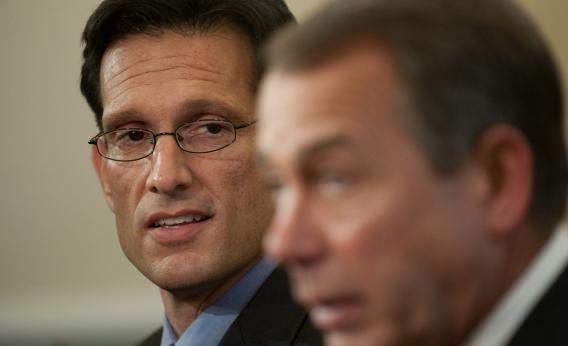Jim Vandehei and Mike Allen have the scoop on how the fiscal cliff talks look from the perspective of insiders who think a deal is likely, from which vantage point the basic framework of a deal is in place and it’s all about the details. But I think the piece in some respects simply highlights how many impediments there are to a deal, one of the most neglected of which is that Republicans lack a well-formulated negotiating position on the crucial issue of entitlements.
If Republicans are going to agree to a deficit reduction bill containing a big tax increase, then obviously they’re going to want large domestic spending cuts. And if we want the basic operations of the federal government to continue, large domestic spending cuts need to contain meaningful reductions in entitlement spending. But while Democrats have been out there banging the table for their preferred tax increases, it’s not at all clear what Republicans negotiating objectives on the entitlement side are. Paul Ryan’s budget, for example, cut Medicare spending by exactly $0 over ten years, promised small cuts in years 11-20, and then giant cuts in years 21-30. Obviously if Democrats proposed that timetable as their spending “concession” Republicans would laugh them out of the room. But that was their proposal! And Mitt Romney, by promising to rollback Obama’s cuts in Medicare reimbursement rates, would have actually increased Medicare spending in the 10-year horizon before theoretically cutting it in the out years.
These weird ideas about long-term precommitment are a key reason I’m against the grand bargaineering enterprise, but this is the framework the negotiators are working with. Back to Vandehei and Allen:
There is only one way to make the medicine of tax hikes go down easier for Republicans: specific cuts to entitlement spending. Democrats involved in the process said the chest-pounding by liberals is just that—they know they will ultimately cave and trim entitlements to get a deal done.
A top Democratic official said talks have stalled on this question since Obama and congressional leaders had their friendly looking post-election session at the White House. “Republicans want the president to own the whole offer upfront, on both the entitlement and the revenue side, and that’s not going to happen because the president is not going to negotiate with himself,” the official said. “There’s a standoff, and the staff hasn’t gotten anywhere. Rob Nabors [the White House negotiator], has been saying: ‘This is what we want on revenues on the down payment. What’s you guys’ ask on the entitlement side?’ And they keep looking back at us and saying: ‘We want you to come up with that and pitch us.’ That’s not going to happen.”
The key point here is that as hard as it is to reconcile Democratic and Republican ideas, it’s completely impossible if Republicans won’t say what they want. And on Medicare there’s simply a lot of cognitive dissonance inside the Republican ranks. The low-tax party naturally wants to be against the fastest-rising element of federal spending, but it also doesn’t want to reduce health care providers’ incomes or old people’s living standards.
